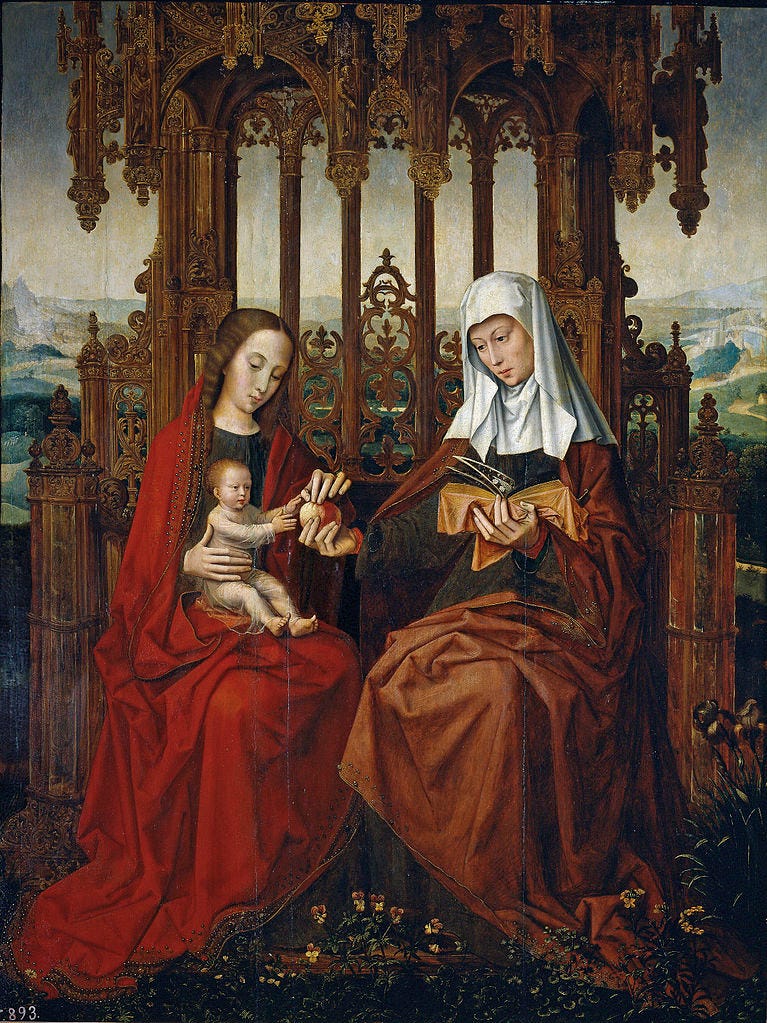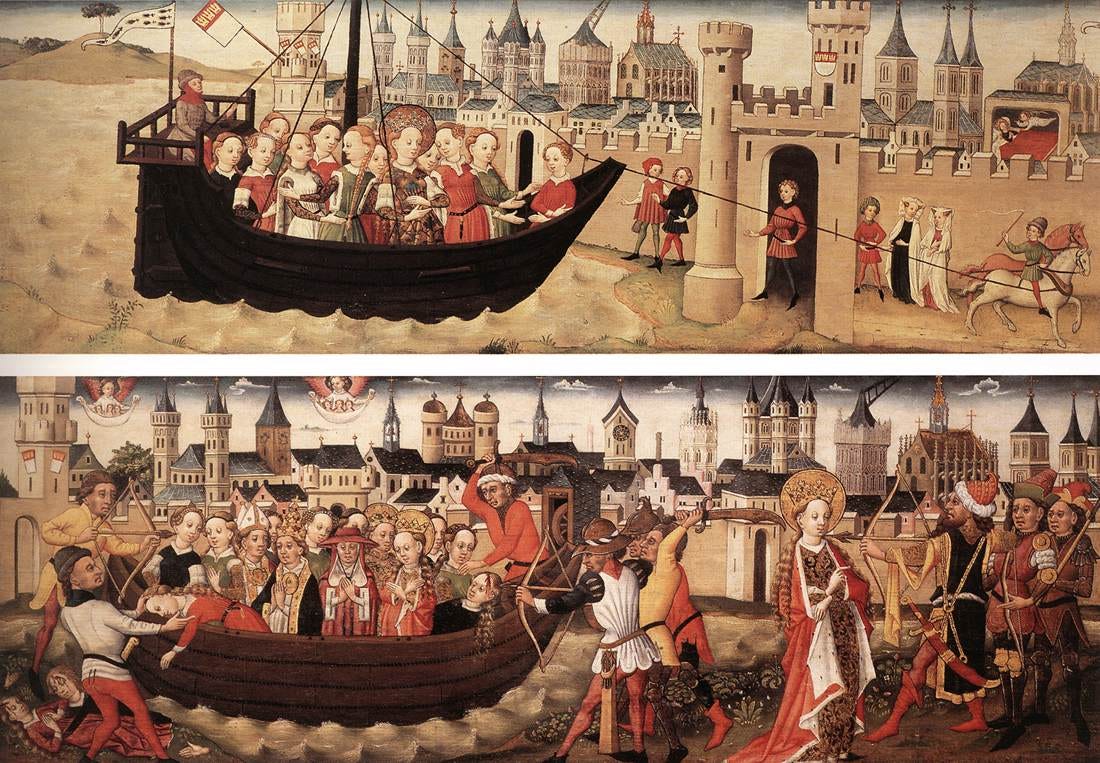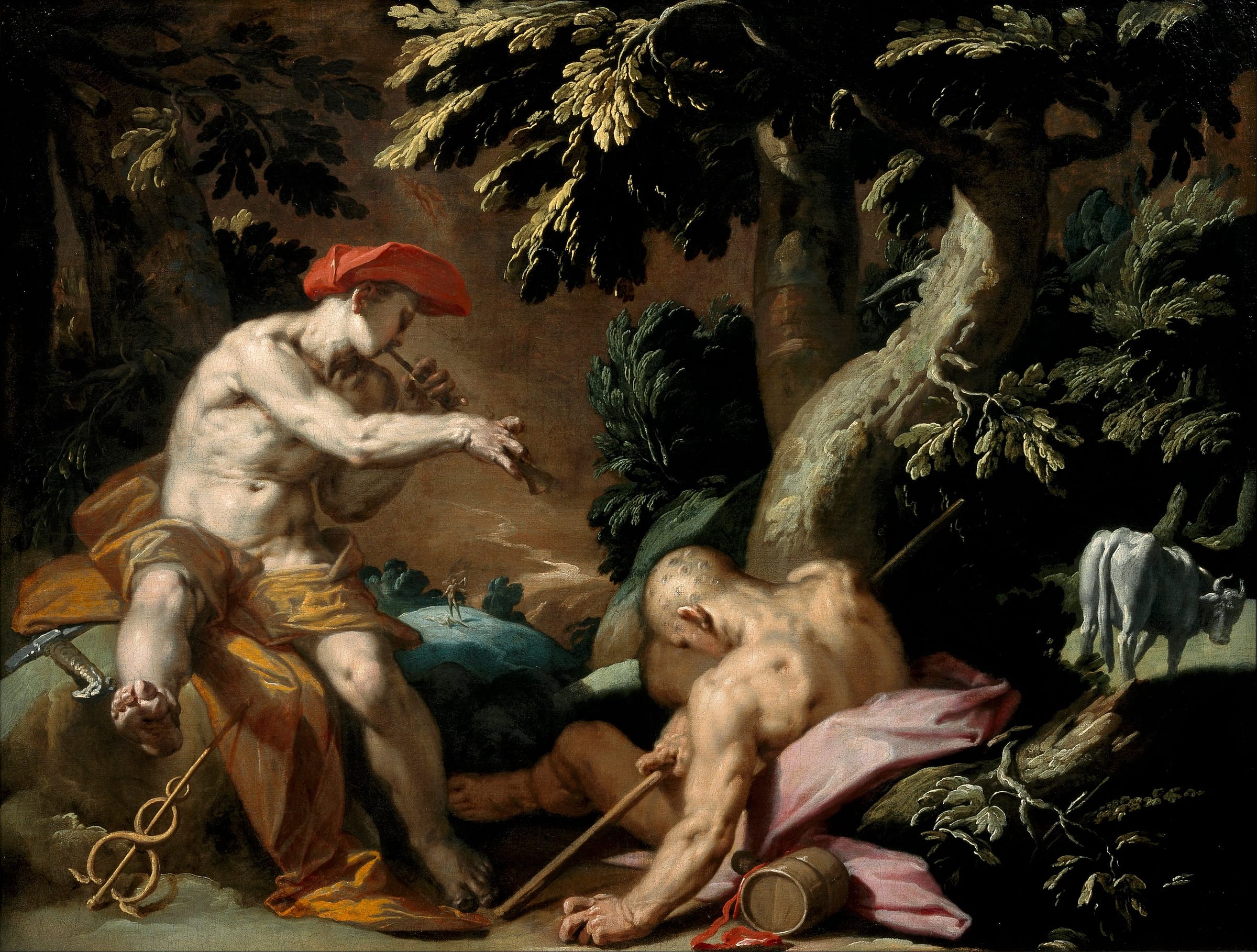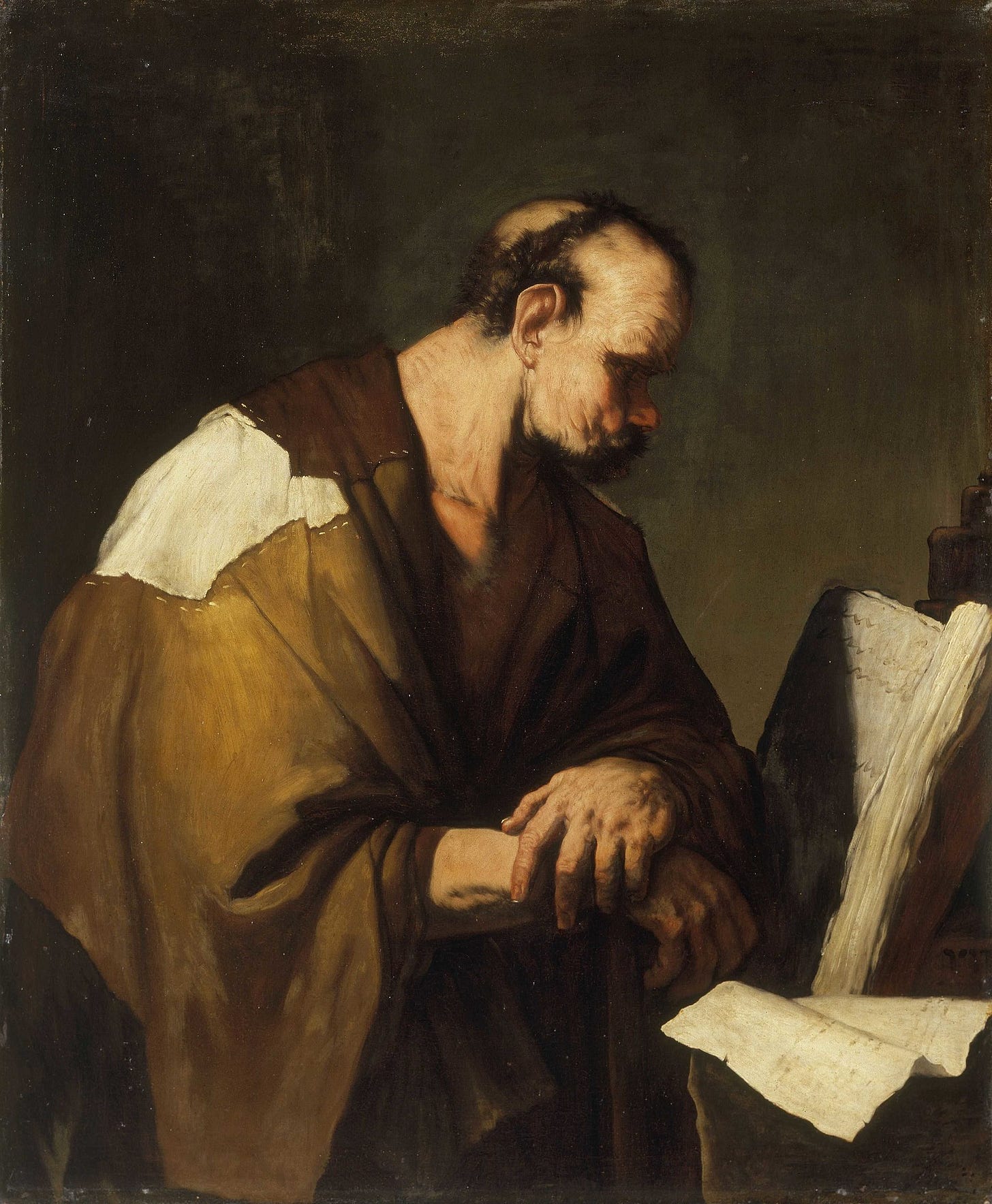This is a long post and is best viewed online here. To get these updates in your inbox, subscribe to Footnotes and Tangents and turn on notifications for Wolf Crawl 2024. This post is now available to download as a podcast: search for Wolf Crawl wherever you get your podcasts.
Welcome to week 34 of Wolf Crawl
This week, we are reading the first half of ‘Wreckage (II), London, Summer 1536’ This runs from page 167 to 209 in the Fourth Estate paperback edition. It begins: “Do you know why they say, ‘There’s no smoke without fire?’” It ends: ‘You must learn to use my title, madam.’
You will find everything you need for this read-along on the main Cromwell trilogy page of my website, including:
Weekly updates, like this one
Online resources about Mantel’s writing and Thomas Cromwell
Writing footnotes and tangents is a full-time job, so I am enormously grateful to paying subscribers who allow me to offer this book guide for free in 2024. As a paid supporter, you can read the bonus episodes on The Haunting of Wolf Hall and start your own discussion threads in the chat area. Alternatively, you can leave a tip to keep me fully caffeinated as I write. Thank you so much for all your support!
This is a long post and may get clipped by your email provider. It is best viewed online here.
Last week’s posts:
This week’s story
It is July, and love is in the air. Or, if not love, then its performance and pagent. A triple marriage between old families, combining and conserving the ancient blood. The king considers the potential marriages of his kinswomen. He, Lord Cromwell, designs a token for Lady Mary to remind her who brought her back from the brink.
Henry’s son, Fitzroy Earl of Richmond, is ailing. Dr Butts says his patient talks of poison. He, Cromwell, takes this opportunity to ask the good doctor for his opinion on Wolsey’s death. His mind runs over his master’s last months, and he asks himself some troubling questions.
Call-Me has uncovered a secret liaison between Margaret Douglas and Tom Truth. He exposes this truth to broad summer light, and our lord Privy Seal. The king’s men interrogate the Princess of Scotland, who says she is married to Thomas Howard. They warn her that they will make her folly a treason. They put her in the Tower.
Tom Truth is to join her, although in separate rooms. The good Gospeller Martin will look after him – he likes poets. Kingston’s wife will spy on Meg for Crumb, as she did before. They remember the headsman’s sword, and he, Cromwell, recalls what was written on the blade.
The king is informed, and Truth is charged with treason: the devil is his accomplice. Call-Me and Cromwell take the prisoner his poems to extract a confession. The rhymes are diabolical. “When he gets home he says to Gregory, ‘Never write verse.’”
He goes to the Pole house to see Wyatt’s secret mistress, Bess Darrell. He has arranged for her to spy on the Courtenays. Margaret Pole disowns her son Reginald, but Bess Darrell shows Master Secretary some treasonous embroidery.
The queen is with her kinswomen, who do their best not to speak ill of the dead. The king is dressed as a Turk, and when he sees Cromwell’s present for Lady Mary, he claims it for himself.
Anne’s women return to court. Mary Shelton, always helpful, corroborates the story of Lady Meg and Tom Truth. Jane Rochford swans in looking for trouble, saying she knows a few things about Queen Jane. ‘I know her method,’ she says. ‘I witnessed everything that she worked against Anne, maid against mistress.’
This week’s characters
Click on each link for more details and plot summaries for each character:
Thomas Cromwell • Henry Howard • William Fitzwilliam • Thomas Wriothesley • Henry VIII • Duke of Richmond • Margaret Douglas • Lady Mary • Dr Butts • Tom Truth • Mary Fitzroy • William Kingston • Richard Riche • Richard Cromwell • Christophe • Bess Darrell • Lady Salisbury • Nan Seymour • Bess Oughtred • Jane Seymour • Mary Shelton • Lady Rochford

This week’s theme: The lives of women
Jane Rochford is back.
'How little you know of our lives,' she says. 'The lives of women, I mean.'
Men make up the greater part of widower Thomas Cromwell’s household and inner circle. For him, the world of women is an inaccessible, closed community that he regards with curious trepidation. At the start of Wolf Hall, he wondered why his wife worried about other women without sons:
Possibly it's something women do: spend time imagining what it's like to be each other. One can learn from that, he thinks.
Because we are always behind Cromwell’s eye, we never see the world from a woman’s point of view. Hilary Mantel takes this narrative limitation and makes it a strength. Cromwell’s survival and success often rest on his very limited ability to access the web of knowledge and experience shared between women.
On several occasions, Cromwell and his male advisors resort to improvisation and female ventriloquism. When assembling the case against Anne, he asks Call-Me to pretend to be ‘a lady of the queen’s bedchamber… May we have a curtsey? Thank you.’ In the last chapter, he drafts Mary’s letter to her father: ‘It is hard for him, to become the king’s daughter.’
The closed room in which women talk without him is represented this week in a memory of Anne’s coronation, where Mary Fitzroy bars Cromwell from entering the queen’s chamber. He barges past the fourteen-year-old girl into Anne’s presence. ‘Let him. He has earned it,’ says Anne. Her ladies-in-waiting will later testify against her and fear and resent Cromwell’s invasion of this private space:
They don’t like to admit how fast they talked, what evidence they gave against her. Cromwell tricks you, they say. He puts words into your mouth. With his manner so suave, he makes you say things you don’t mean.
Now, Cromwell returns for more. ‘Wreckage, he thinks. Winter and spring we watched Anne, but should we have watched another lady?’ If the king’s niece, Margaret Douglas, marries a Howard, Tom Truth may be our next king. And if Truth is king, his brother Norfolk will be our lord. And we, the Cromwells, will be dead.
Mr Wriothesley says, 'Sir, I leave the women to you.'
What do female spaces sound like to Cromwell? Mantel writes a beautiful sentence, rustling with sibilance as women run with their secrets away from Master Secretary’s ponderous plod:
The scuffling and haste, the sudden vanishing of papers, the shushing, the whisk of skirts and the slammed doors; the indrawn breath, the glance, the sigh, the sideways look, and the pit-pat of slippered feet; the rapid scribble with the ink still wet; a trail of sealing wax, of scent.
This week, he brings back to court Mary Shelton, ‘clerk of the poetry book’ that ‘circulated among the dead queen’s slaves and admirers.’ He recalls Jane Rochford, who said more than most to bring the Boleyns down. He interviews Margaret Douglas and Bess Darrell, two women in love, with motivations entirely opaque to Lord Privy Seal.
Margaret Pole, Jane Seymour and her sister Bess. The more he sees of these women, the less he understands them. Wolsey used to say, find out what men want and see if you can give it to them. With women, he thinks, I am too often astonished and too often wrong. Queen Jane says,
‘One time or other, before he had so much to do, Lord Cromwell used to bring us cakes. Orange tarts in baskets. When she was displeased with him, the queen threw them on the floor.’

Footnotes
1. Mary’s former saints
Cromwell gets Hans Holbein to make Mary a ring to remind her who saved her from the scaffold.1 He imagines her wearing it on her girdle – ‘where formerly she carried two or three pious tokens, emblems of those saints to whom maidens pray.’ The message: those dead women did you no good. Try these living men: Saints Thomas and Henry Tudor.
St. Ursula was a fourth-century Romano-British woman who set out to Rome on pilgrimage but was killed by Huns besieging the German city of Cologne. She was massacred with the improbable 11,000 virgins who accompanied her. Scholars have suggested that a translation or copying error by medieval monks transformed one or eleven virgins into 11,000.
St Ursula featured in the pageantry at Katherine and Arthur’s wedding. Perpetua and Felicity were two early Christian martyrs killed by wild beasts in the Roman city of Carthage in 203.
We know from a letter written by Chapuys dated 23 July 1536 that this gift existed. Henry liked it so much that he claimed the honour of giving it to Mary himself. The historian Diarmaid MacCulloch questions the decision to translate the gift as a ring, given that Chapuys is clearly describing a medal. Personalised medals were rare in England, and MacCulloch argues that this was ‘another tribute to Cromwell’s Italian taste, which he repeated for himself or his son a couple of years later.’
Further reading:

2. Gardiner’s pupil
At Austin Friars, they admire Mr Wriothesley: his tenacity, his willingness to back his belief that there’s no smoke without fire.
Thomas Wriothesley is conspicuously omnipresent in this chapter. He uncovered the ‘plot’ to marry Tom ‘Truth’ Howard to Margaret Douglas. Call-Me is a self-conscious young man. When he puts on his cap, he ‘looks closely at his master, as if trying to see a little Call-Me reflected in his eyes.’
Nan Seymour calls him ‘handsome Mr Wriothesley’, but the queen refers to him as ‘the thing of the Signet’, a turn of phrase that amuses Cromwell: he uses it a few pages later. Women are often afraid of Cromwell, but they are never afraid of Call-Me. ‘Though sometimes, he thinks, I am.’ He, Cromwell.
In a previous chapter, Wriothesley misremembers how Cromwell tortured friars in the Tower. Here, he warns Tom Truth that Cromwell ‘once broke a man’s jaw with a single blow.’ It is something Wolsey told him. You may recall from Wolf Hall, how the cardinal ‘invented’ Cromwell. And later, how Cromwell wondered who would invent him now the cardinal was gone.
Perhaps Wriothesley doesn’t have the imagination to invent Cromwell. But he does perpetuate the image of his master as violent, thuggish and ruthless. This may not always be to Cromwell’s advantage.
And a final thought: Call-Me threatens Tom Truth with torture. He did the same to Mark Smeaton in Bring Up the Bodies. This foreshadows Wriothesley’s dark future. In 1546, the Protestant Anne Askew was racked in the Tower. The Lieutenant of the Tower refused to continue with the torture, so two of the king’s councillors proceeded on their own. They were Richard Riche and Thomas Wriothesley.

3. Never write verse
'You do not write verse yourself?' Mary Fitzroy asks. 'Why enter a crowded field?' he says.
Hilary Mantel writes that ‘In the households of Henry VIII, almost everyone (though seemingly not Thomas Cromwell) tried to be a poet.’2 In an age where everyone was rhyming, I think Mantel relished the challenge of writing a lyrical account of Master Secretary, the least poetical of Tudors.
Mantel’s supple style allows her Cromwell to be a poet in his mind. What do I mean by this? Well, if she had written him in the first person, she may have felt compelled to flatten the prose to capture his voice. In the (very close) third person, we are not entirely sure who is telling the story, Cromwell or Mantel. I have this peculiar hunch that the Cromwell trilogy is actually narrated by Thomas Wyatt as Thomas Cromwell.
In Wyatt’s verse there is a tussle in every line. In the verse of Lord Thomas, there is no contest at all, just a smooth surrender to idiocy.

4. Of the dead nothing but good is to be said
Elizabeth Seymour is now the widow Bess Oughtred. Cromwell had some suppressed amorous feelings towards Jane’s older sister in Bring Up the Bodies. Now, she astonishes him with her knowledge of Latin:
Bess says, 'We thought it was Boleyn's secrets they were keeping,' She looks sobered. 'De mortuis nil nisi bonum.'
A free translation of the Latin gives us the modern-day commandment to ‘never speak ill of the dead.’ It is usually attributed to Chilon of Sparta. The phrase has enormous significance for the Cromwell trilogy and historical fiction in general. It reminds me of this novel’s epigraph by the French poet François Villon:
Brother men, you who live after us, Do not harden your hearts against us.
How are we to speak about the dead? Is historical fiction inherently indecent, even sacrilegious, in its manner of putting words in dead men’s mouths? Mantel took her task very seriously, and I believe she felt a responsibility to reach for the truth. I understand she conveyed this sense of responsibility to the actors in the stage adaptations. When the production of Bring Up the Bodies coincided with the anniversary of the deaths of Anne’s reputed lovers, she was especially anxious that they did right by the dead.
He, Cromwell, has other ideas:
He thinks, the dead are crowding us out. Rather than not speak ill of them, how if we don’t speak of them at all? We don’t speak of them, we don’t think of them, we give their clothes to beggars and we burn their letters and their books?
Here is a man desperate to forget. When Dr Butts says Lady Mary should marry to quieten her ghosts, he wonders, ‘can you help seeing ghosts? Don’t they just turn up and make you see them?’
As I have written elsewhere, Cromwell doesn’t believe in ghosts, but the ghosts believe in him.

Quote of the week: No smoke without fire
Growing up, I never understood this saying. It always conjured up images of damp, smouldering wood or a blown-out match. In other words, it made me think of the absence of fire. Cromwell thinks:
Do you know why they say, ‘There’s no smoke without fire?’ It’s not just to give encouragement to people who like fires. It’s a satement about the danger of chimneys, but also about the courts of kings – or any space where trapped air circulates, choking on itself. A spark catches a particle of falling soot: with a crackle, the matter ignites: with a roar, the flames fly skywards, and within minutes the palace is ablaze.
Chimneys became more common during the Tudor era as cities grew outwards and upwards. Remember Wolsey’s lousy chimneysweep, who Cromwell fobbed off onto the Duke of Suffolk at the start of Wolf Hall? This opening passage reintroduces one of the images that ran through the previous two books: a collapsed building, the roof falling in. Wreckage. This image returns next week when Cromwell sees himself, ‘blackened as he crawls, as if escaping from a burning building.’
When he is not on a knife edge or on the brink, he is watching for the spark that will ignite and bring everything crashing down.

Next week
Thank you for reading and joining me on this slow read of the Cromwell trilogy. Next week, we are reading the second half of ‘Wreckage (II), London, Summer 1536’ This runs from page 209 to 251 in the Fourth Estate paperback edition. It begins: ‘As he walks into Austin Friars he meets Richard Cromwell.’ It ends: ‘He stood with his back to the brick, feeling the beating of his own heart: waiting to see what he would do next.’
And before I go, a quick reminder that this book group is entirely funded by its readers. So, if you have enjoyed this post and found it helpful, please consider a paid subscription to access the bonus episodes on The Haunting of Wolf Hall and start your own discussion threads in the chat area.
Alternatively, you can show your support with a one-off contribution by leaving me a tip over on Stripe. These always make my day and remind me that this project is worthwhile and finding a good home.
Until next week, I am your guide,
Master Simon Haisell
The ring is engraved with a proverb in praise of obedience. Mary and Thomas Cromwell belonged to a conservative culture that was deeply hierarchical and had obedience at its core. ‘Obedience binds us together; all practice it, under God.’ Curiously, Cromwell goes on to think: ‘It is the condition of our living as humans, in cities and dwelling houses, not in hides and holes in the fields.’ A couple of pages later, Dr Butts says that ‘Cain invented cities. And if it was not he, it was someone else fond of murder.’ These are two contrasting images: cities force us to live together in obedience to the law. They are also plague-ridden holes where the death rate is always higher than elsewhere.
In “Cut Out and Stitch a Tudor”, additional notes at the end of the first edition hardback of The Mirror and the Light.




The term / image “female ventriloquism” is so rich! It’s an interesting consideration in historical research, when fewer women’s voices were recorded in writing. And in historical fiction, particularly when writing about times so deeply steeped in patriarchy. I remember reading that reflective line in Wolf Hall when Cromwell notes how women imagine being other women and immediately highlighting it in my Kindle. It jumps out on every reread. The work of the Cromwell Trilogy, among its myriad other achievements, is an example of that exercise by its brilliant author. Thanks as always for a great post, Simon! What a great way to start the day (US reader here).
When we read Books 1 and 2, I was rereading them, but Book 3 is my first run-through. What I notice at this point is a slight flattening of Cromwell’s character. He feels to me more brutish, more selfish. Whereas previously I was completely on his side (I saw him as a realpolitik genius with an essentially good heart), now I seesaw between support and dislike.